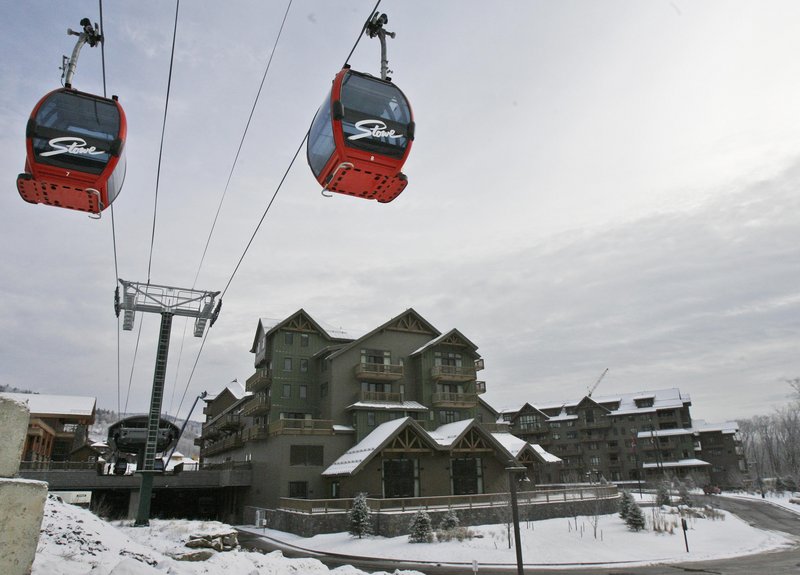MONTPELIER, Vt. – When he signed to buy a condo at Vermont’s Stowe Mountain Resort, Patrick Sullivan was told his share of fees charged by the resort developer for hotel-type services would be about $410 a year, not the roughly $8,000 a year the resort ended up charging.
Sullivan, a 52-year-old investor who lives in Greenwich, Conn., calls it a classic bait-and-switch.
Now, he’s among about 300 condo owners who filed suit Friday in U.S. District Court in Burlington against affiliates of insurance giant American International Group, which owns the resort.
Owners maintain they put down 20 percent deposits on their units in 2005. When changes in the fees came just before closing in 2008, they say they weren’t given an opportunity to back out.
“I don’t think any of us expected to find the issues we found when we started to get our bills,” Sullivan said in an interview.
AIG, which received about $182 billion in federal bailout money in 2009 after nearly collapsing, put the Stowe Mountain Resort up for sale, but eventually sold it to its own subsidiary, Chartis, last year. The suit names as defendants the entities set up to sell the condos and manage the project, Spruce Mountain Realty and Stowe Mountain Lodge.
Marie Ali, a spokeswoman for Chartis, said Friday, “We believe Stowe Mountain has acted appropriately, and will defend itself vigorously.”
The condo owners, according to their lawyer, Russell Barr of Stowe, see it differently.
“This case is about a Wall Street-owned Vermont condominium hotel developer’s attempt to mislead and defraud residential unit purchasers out of millions of dollars through the use of an incomprehensible and ultimately unlawful monstrosity of a development scheme,” the suit says in its introduction.
Complaints, in a separate “background” document provided by the plaintiffs and Sullivan in an interview, included:
• Construction delays meant about three years passed between the time many of the condo owners put down deposits in 2005 and when they closed on the purchases in 2008.
• The property was going to operate like a hotel, with condo owners’ units rented out when the owners weren’t there and with typical hotel desk, concierge and other services. Buried deep in hundreds of pages of legal language, Sullivan said, were new provisions saying the owners weren’t to be billed for hotel-type services only on the days they were at the resort, as they had been led to believe, but year-round.
• The covenants were structured so that the condo owners were never able to take over management of the property, the norm with condominium developments, Sullivan said.
• The condo owners share the building with a restaurant, a store and other spaces for which the resort retains ownership, but residents are charged 90 percent of the cost of running the property.
• Condo fees are “more than twice what the owners were told they would be,” according to the lawsuit.
Send questions/comments to the editors.



Success. Please wait for the page to reload. If the page does not reload within 5 seconds, please refresh the page.
Enter your email and password to access comments.
Hi, to comment on stories you must . This profile is in addition to your subscription and website login.
Already have a commenting profile? .
Invalid username/password.
Please check your email to confirm and complete your registration.
Only subscribers are eligible to post comments. Please subscribe or login first for digital access. Here’s why.
Use the form below to reset your password. When you've submitted your account email, we will send an email with a reset code.